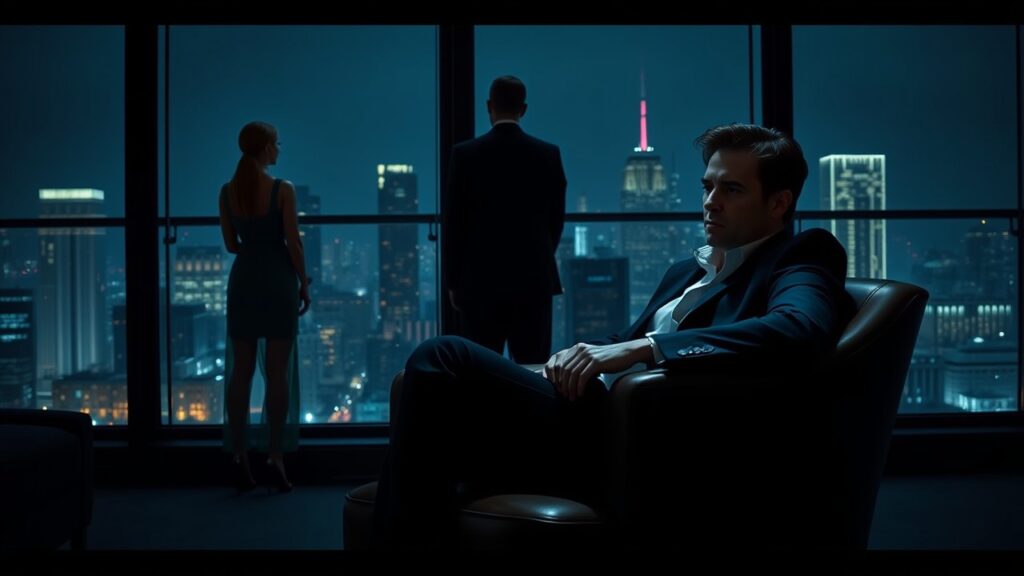
Shades of Submission
My name is Elias Varnholt, and I never thought I’d find myself in a story like this—one where the edges of my life, my identity, and my desires would fray into something unrecognizable. I’m a man who values control: in my work as a structural engineer, in the meticulous way I organize my desk, in the quiet routines I’ve built with my wife, Seraphina. But control, I’ve learned, is a fragile thing, easily shattered by forces you don’t see coming.
Seraphina and I have been married for seven years. She’s a painter, her canvases bursting with colors that seem to pulse with her energy—wild, unpredictable, and magnetic. Her auburn hair falls in loose waves, and her hazel eyes have a way of pinning you in place, like she’s seeing through to your core. We met at an art gallery opening, where I was drawn to her laugh before I even saw her face. She was everything I wasn’t: spontaneous, vibrant, unafraid of chaos. I thought we balanced each other perfectly. Until Thane.
Thane Marek entered our lives like a storm cloud on a clear day. He was Seraphina’s new art dealer, a man with a reputation for turning unknown artists into sensations. He was tall, with sharp cheekbones and eyes like polished obsidian, always dressed in tailored suits that screamed money and confidence. When he shook my hand at Seraphina’s latest exhibition, his grip was firm, his smile a little too knowing. “Elias,” he said, his voice smooth as aged whiskey, “you must be proud of her. She’s going to be a star.”
I was proud. Seraphina’s talent deserved the spotlight, and Thane seemed like the key to unlocking it. He was charming, professional, and attentive—too attentive, I’d later realize. But at first, I was grateful. Her paintings started selling, galleries in Berlin and New York wanted her work, and Thane was always there, orchestrating it all. He’d call her late at night to discuss contracts, show up at our apartment with bottles of wine to “celebrate her success,” and linger a little too long when he said goodbye. I told myself it was just business. I told myself I was secure.
But then came the dinner.
It was a Friday night, and Thane invited us to his penthouse to meet a potential investor, a woman named Isolde Crane. Seraphina was buzzing with excitement, her cheeks flushed as she slipped into a emerald-green dress that hugged her curves. I wore my best suit, feeling out of place but determined to support her. Thane’s penthouse was a fortress of glass and steel, overlooking the city skyline like it was his personal kingdom. The air smelled of cedar and expensive cologne, and soft jazz played from hidden speakers. Isolde was there, a sharp-eyed woman in her fifties with a clipped British accent, but it was clear from the start that Thane was the one in control.
Dinner was lavish—roasted quail, truffle risotto, wine that probably cost more than my monthly salary. Thane sat at the head of the table, Seraphina to his right, me across from her, and Isolde at the other end. The conversation flowed easily at first, centered on art and Seraphina’s potential. But as the night wore on, I noticed the way Thane’s eyes lingered on her, the way his hand brushed hers when he passed her a glass. I told myself I was imagining things. I told myself I was being paranoid.
Then Thane leaned back in his chair, swirling his wine, and fixed his gaze on me. “Elias,” he said, his tone casual but laced with something darker, “you’re a practical man, aren’t you? You understand the sacrifices it takes to get ahead.”
I nodded, unsure where this was going. “Sure. Hard work, discipline, that sort of thing.”
He smiled, but it didn’t reach his eyes. “Exactly. But sometimes, success demands… unconventional sacrifices. Don’t you agree, Seraphina?”
She laughed, a nervous sound, and glanced at me. “I suppose. Art’s always been about pushing boundaries.”
Thane’s smile widened. “Precisely. And tonight, I’d like to propose a boundary we could push. For your career, Seraphina. For your future.”
My stomach twisted. Isolde excused herself to take a call, leaving the three of us alone. The air felt heavier, like the prelude to a storm. Thane leaned forward, his voice low. “Seraphina, you have a gift. But talent alone doesn’t open doors. Influence does. Connections. And I can give you those—if you’re willing to play the game.”
I opened my mouth to speak, but Seraphina beat me to it. “What kind of game?” Her voice was cautious, but there was a spark in her eyes—curiosity, maybe, or something else I didn’t want to name.
Thane’s gaze flicked to me, then back to her. “A private arrangement. A demonstration of… commitment. To show you’re serious about your place in this world.” He paused, letting the words hang. “I’d like Elias to watch.”
The room spun. My heart pounded in my chest, and I felt the heat rising in my face. “Watch what?” I said, my voice sharper than I intended.
Thane didn’t flinch. “Watch you, Seraphina. With me. A moment of intimacy, nothing more. A gesture to seal our partnership. Elias, you’d be part of it, in a way. You’d be supporting her success.”
I was on my feet before I realized it, my chair scraping against the hardwood floor. “Are you out of your mind? You think I’d just sit here and—”
“Elias,” Seraphina cut in, her voice soft but firm. She reached for my hand, her fingers cold. “Let’s hear him out.”
I stared at her, disbelief crashing over me like a wave. “Hear him out? Sera, this is insane. He’s asking me to—us to—”
“I know what he’s asking,” she said, her eyes locked on mine. “But think about it. My work, my dreams… we’ve been struggling for years. This could change everything.”
I felt like I’d been punched. My wife, the woman I loved, was considering this. Not just considering—she was looking at me like I was the one who needed to be convinced. I sank back into my chair, my legs unsteady.
Thane spoke again, his voice calm, almost soothing. “Elias, I know it’s a lot to take in. But this isn’t about betrayal. It’s about power. About giving Seraphina what she deserves. You’d be showing your strength, your willingness to put her first. Isn’t that what love is?”
I wanted to scream, to throw the table across the room, to drag Seraphina out of there and never look back. But her hand was still in mine, and her eyes were pleading—not for me to stop this, but to understand. To agree.
“I can’t,” I whispered. “Sera, I can’t do this.”
She squeezed my hand, her voice barely audible. “I need this, Elias. For us. For me. Please.”
The word “please” broke something in me. I’d always been the one to fix things, to hold us together. But now, she was asking me to let go, to step into a role I couldn’t fathom. I looked at Thane, his expression unreadable, and I hated him. I hated his confidence, his control, the way he’d turned my life into his game. But most of all, I hated the part of me that was considering it—not because I wanted to, but because I didn’t want to lose her.
The rest of the night is a blur. I remember agreeing, though I don’t know how the words left my mouth. I remember Thane leading us to a room down the hall, all sleek furniture and dim lighting. I remember sitting in a leather chair, my hands gripping the armrests so hard my knuckles turned white. I remember Seraphina’s eyes meeting mine, a mix of guilt and determination, before she turned to Thane.
I won’t describe what happened next. Not because I can’t, but because the details don’t matter. What matters is how it felt—like my chest was caving in, like every breath was a struggle. I wanted to look away, but I couldn’t. I wanted to hate her, but I didn’t. I wanted to hate myself, and that part came easily.
When it was over, Thane was all business again, as if nothing had happened. He poured me a glass of bourbon and clapped me on the shoulder, like we were old friends. “You’re a good man, Elias,” he said. “You’ve done something extraordinary tonight.”
Seraphina didn’t speak as we left. In the car, she stared out the window, her hands folded in her lap. I wanted to yell, to cry, to ask her why, but the words wouldn’t come. When we got home, she went straight to the bedroom and closed the door. I slept on the couch, or tried to, staring at the ceiling until dawn.
The weeks that followed were a slow unraveling. Seraphina’s career took off—galleries fought over her, collectors called her a prodigy, and Thane was always there, a shadow in every triumph. I went through the motions at work, designing bridges and buildings, but my mind was elsewhere. I couldn’t stop seeing that night, replaying every moment, every look. I told myself it was a one-time thing, a sacrifice we’d made together. But then Thane called again.
He wanted another “meeting.” Another demonstration of commitment. Seraphina didn’t argue this time. She just looked at me, waiting for my answer. And I gave it, because what else could I do? I loved her. I hated her. I didn’t know the difference anymore.
The second time was worse. Not because it was different, but because it was familiar. I knew what to expect, and that made it unbearable. I started noticing things I hadn’t before—the way Seraphina leaned into Thane’s touch, the way her breath caught when he whispered something I couldn’t hear. I told myself it was an act, that she was doing this for her career, for us. But doubt is a poison, and it was spreading.
I started drinking more. I stopped sleeping. At work, I made mistakes—small ones at first, then bigger ones. A colleague pulled me aside one day, asking if I was okay. I laughed it off, but I wasn’t. I was falling apart, and Seraphina was slipping away. She was still my wife, still in our home, but she was different. Bolder, maybe. Or just distant.
One night, I confronted her. We were in the kitchen, the dishes from dinner still in the sink. “Do you love him?” I asked, my voice shaking.
She didn’t answer right away. She looked at me, her eyes soft but unreadable. “I love you, Elias,” she said finally. “But this… it’s not about love. It’s about who I need to be right now.”
I didn’t know what that meant, but it felt like a knife. “And what about me?” I said. “What am I supposed to be?”
She reached for me, but I pulled away. “You’re my husband,” she said. “You’re the one I come home to.”
But I wasn’t. Not really. I was the man who watched, who stood on the sidelines while Thane took what I thought was mine. And the worst part? Some twisted part of me started to feel something else—something I couldn’t name at first. It wasn’t arousal, not exactly, but a strange, dark fascination. The humiliation was still there, burning like acid, but there was something else, too. A pull. A need to see it again, to feel that raw, jagged edge of pain and powerlessness. I hated myself for it, but it was there.
Months passed, and the “meetings” continued. Not every week, but often enough to become a rhythm in our lives. Thane would call, Seraphina would go, and I’d follow, like a dog on a leash. Each time, I told myself it would be the last. Each time, I stayed.
One night, after another session at Thane’s penthouse, I found myself alone in our living room, staring at a painting Seraphina had made years ago—a chaotic swirl of blues and reds, like a storm trapped on canvas. I realized I didn’t recognize her anymore, not in her art or her eyes. And I didn’t recognize myself, either. The man who’d built bridges, who’d prided himself on structure and stability, was gone. In his place was someone else—someone who’d let this happen, who’d chosen it, in a way.
I don’t know if I’ll leave her. I don’t know if I can. Seraphina’s star is rising, and I’m still here, tethered to her by love or habit or something darker. Thane is still in our lives, a constant shadow. And me? I’m still watching, still caught in this strange, twisted dance I don’t fully understand.
Maybe one day I’ll find the strength to walk away. Or maybe I’ll stay, because this pain, this loss, has become part of me. All I know is that I’m Elias Varnholt, and this is my story—not one I chose, but one I’m living.











Leave Your Comment